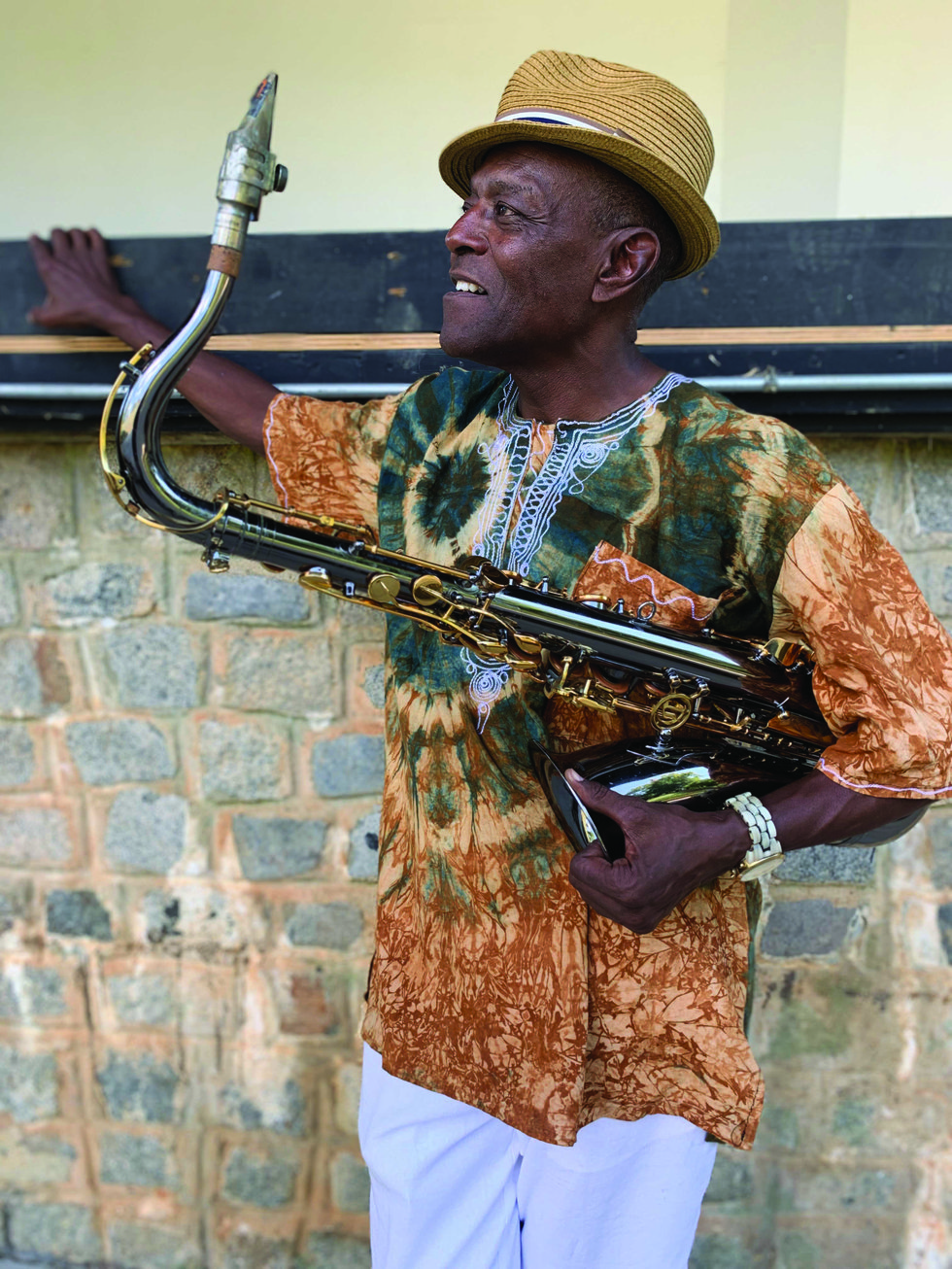Richmond jazz legend James “Plunky” Branch finds his new calling.

Last spring, a few weeks into the pandemic, James “Plunky” Branch watched a news story about Japanese violinist Lena Yokoyama performing on the roof of the Maggiore hospital in Cremona, northern Italy. She dedicated the performance to the healthcare workers and volunteers on the frontlines of the coronavirus crisis. “It was such an eerie feeling,” Branch remembers. “She was on that roof, not with throngs of people, just that empty roof, and this sound of her playing.”
Days later, Branch, an internationally known jazz musician, songwriter, music and film producer, educator, and organizer, grabbed his saxophone and stepped onto his front porch in Richmond’s Byrd Park area to serenade his neighborhood. Branch went back out on his porch the next day to play for 20 minutes, and every day after that, rain or shine, as the crowds grew.
“Eventually it became a bigger thing than me just imitating this woman from Italy,” Branch says. He invited members of his band to join him. “After three months, somebody had the idea of streaming it live. In short order, people did stories in the newspapers and it got on TV. The response was much bigger than what I had expected when I first went out there.”

Photo courtesy Plunky Branch
While he may have won many new fans this way—thousands tuned in to the live feed—Branch has been a fixture in not just the local, but the international, music community for decades. With different incarnations of his group Oneness of Juju, he has released almost 30 albums, many of which have been re-issued on vinyl in recent years as his mix of jazz, funk, and Afrobeat has been covered and sampled by hip hop artists. “Plunky’s legacy embodies the values of hard work and dedication,” says Marcus Tenney, a Richmond recording artist and member of the jazz-funk group Butcher Brown. “He has inspired myself and many, many others over the years.”
Hailing from Richmond’s Southside, Branch has been called by his nickname “pretty much forever.” In 1966, he set out for Columbia University in New York, but during his junior year, Branch moved to California, chasing music as a career. In San Francisco, he met Ndikho Xaba, a South African composer, multi-instrumentalist, instrument-maker, actor, teacher, and revolutionary, who became his mentor. “That was a transformative period for me,” Branch remembers. Under Xaba’s tutelage, the young saxophonist learned that jazz and African music were related, and that in African aesthetics, the idea of what’s good and beautiful was very different from the music that Branch had been taught. “With African music, the emphasis is on the energy, the improvisation and the rhythm, and it is also judged by its impact on culture and society,” he says.
After touring and recording with Xaba for nearly two years, in 1971 Branch founded his group Juju, later renamed Oneness of Juju. “The name has all these African spiritual, social, and political connotations,” he says. With Juju, Branch paired his saxophone playing, influenced by John Coltrane, with African and Afro-Cuban sounds. The group relocated to New York City and then Richmond, Branch’s hometown, where he founded the Richmond Jazz Society and the first Black art gallery statewide, in Church Hill.
In the decades to come, Branch’s group performed with some of the biggest names in music, including Ray Charles, Earth Wind & Fire, LL Cool J, and Chuck Brown, and toured the world and some of the most prestigious venues back home, including the Kennedy Center for the Performing Arts in Washington, D.C., and Lincoln Center in New York. In his hometown, Branch has received the prestigious 50 For 50 Award from the Virginia Commission for the Arts as one of the 50 outstanding arts persons in Virginia of the last 50 years. In 2015, he was selected as one of the Strong Men & Women in Virginia History by the Library of Virginia.
Branch has been a fixture in not just the local, but the international, music community for decades.
While COVID-19 may have put a stop to Branch’s touring, he has found a new purpose in his daily front porch performances, which, after a winter break, he plans to pick up again this spring. “I’ve had lots of insecurity about it,” he admits. “I didn’t want to bother anybody. Why am I imposing my sound for half an hour on people who might not want to hear it? And am I good enough to demand somebody listen to my solos?”
But those doubts were overridden by the positive reactions he got from people. “And I thought, suppose Miles Davis or Sonny Rollins lived on a block, and everything was shut down, and no one was able to play at the clubs, how would they get their thing off, that thing that drives us to want to present to people?” he says. “And wouldn’t they be honored by and for doing this for their neighbors?” PlunkyOne.com
This article originally appeared in the February 2021 issue.








